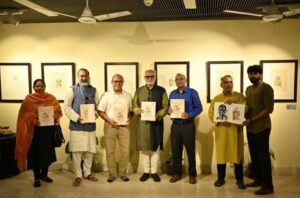Team L&M
The Conservation and Archives Division of the Indira Gandhi National Centre for the Arts (IGNCA) hosted an exhibition titled People and Places of India – A Retrospect in celebration of International Labour Day, May 1. The exhibit features lithographs by Karl Erich Muller from the IGNCA Archives. Dr Sachchidanand Joshi, Member Secretary of IGNCA, graced the event as the Chief Guest, while distinguished lithography and printmaking artist Dattatraya Apte was the Guest of Honour. A catalogue showcasing the works of Karl Erich Muller was also launched on the occasion.

The display of 20 original lithographs by Karl Erich Muller are categorised into themes such as tourist perspectives, temples and heritage, portraiture, and village festivals. Müller was a prominent German artist associated with the Halle School and known for his ‘Socialist Realism’ style globally, and had a profound connection with India, influenced by the Bengal school and Santiniketan. He also interacted with Indian artists such as KK Hebbar and Lalita Lajmi and collaborated with them to create portraits. Subsequently, his book ‘Mein Indien’ showcased thirty-one lithographs. Müller’s works depict various aspects of everyday life in the 1970s, including laborers, transport workers, factory workers, and fisherwomen in their natural environments. These works are housed in IGNCA, NGMA, and Bharat Kala Bhawan.
In his address, Apte expressed a profound sense of connection with Erich Muller through his artistic creations. He elaborated on how Muller’s lithographs serve as a reflection of his keen observations of people and their daily lives, offering a poignant glimpse into the society of his era. His work, serving as a mirror to the society of his times, holds archival value, encapsulating the essence of his era and offering a vivid representation of the spirits through his art. Influenced by socialism, Muller keenly witnessed and endured the challenges of his time, which he expertly depicted through his art. He emphasised the artist’s ability to translate personal experiences into powerful artistic expressions.
Dr Joshi expressed the uniqueness, rarity, and surreal essence of lithographs, emphasising how they encapsulate the essence of ordinary lives. He reiterated that not all expressions require abundant resources, showcasing how Karl Erich Muller communicates this profound teaching through his lithographs. He accentuated the significance of IGNCA as a repository of cultural artefacts, emphasizing the importance of curating it with the meticulousness evident in this exhibition. He commended the Conservation and Archives team for their efforts in curating such a relevant exhibition and encouraged everyone to spread awareness about it through social media. “There need for further endeavours in this realm, fostering a culture of inspiration for people of all ages, especially the youth,” he said.
Among the notable attendees were Prof. Ramesh Chandra Gaur, Dean (Administration) and Head of the Kalanidhi Division, Varun Jain, Trustee of the Sanskriti Foundation, and Dr Kumar Sanjay Jha, Archivist at IGNCA.
Prof Ramesh Chandra Gaur extended warm greetings on the occasion of International Labour Day, commending the team of the Conservation and Archives Division for organizing such an insightful exhibition. He highlighted the immense value of IGNCA’s cultural archives, boasting over 45 collections dedicated to art and culture. “Exhibitions like this serve as a remarkable effort to make IGNCA’s archives accessible to the public,” he said. Speaking about Muller’s works, he asserted their role as a historical narrative of his era, presenting an unaltered portrayal of reality that contrasts with potentially biased historical accounts.